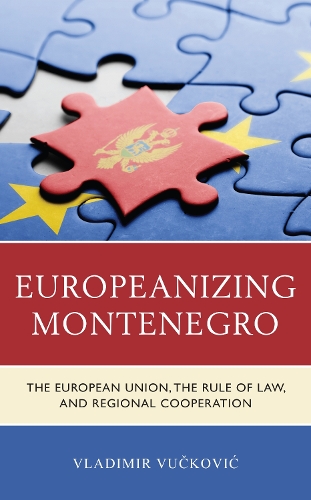
Europeanizing Montenegro: The European Union, the Rule of Law, and Regional Cooperation
(Hardback)
Publishing Details
Europeanizing Montenegro: The European Union, the Rule of Law, and Regional Cooperation
By (Author) Vladimir Vuckovic
Bloomsbury Publishing PLC
Lexington Books
24th June 2021
United States
Classifications
Professional and Scholarly
Non Fiction
341.24220949745
Physical Properties
Hardback
282
Width 162mm, Height 228mm, Spine 28mm
612g
Description
The volume aims to examine Europeanization of Montenegro, a regional frontrunner among all Western Balkans in the EU integration process, through EU impact on domestic governmental changes by focusing on three political membership conditions of the EU: judicial reform, fight against the corruption, and development of regional cooperation and good neighbourly relations.
This book is based on the argument of the EU transformative power having produced negatively reinforcing effects in key accession criteria in the candidate country within the ten years of integration period. The given deficiency of fulfilment of political conditions in Montenegro is, on the one hand, primarily the result of an inconsistent and inefficient EU conditional policy, and unfavourable domestic factors to appropriately conduct reform activities, thus resulting in generally weak and mitigating reform progress. In addition, the book has claimed that the effective adoption and alignment with the EU accession demands does not solely depend on interdependency of the EU and domestic factors (as it was explained by the Schimmelfennig and Sedelmeier theory of Europeanization), but rather it also substantially depends on influence of other international factors, namely the influence of Russia and China in the Western Balkan region. The states possibility to choose the policies of alternatives instead of opportunities i.e. to cooperate with other international factors which do not question political legitimacy of the domestic ruling elites nor do they interfere into internal political affairs, has significantly affected reduction of euphoria for the advance in the EU accession process with the domestic political leaders. The current EU foreign policy in the form of the enlargement process more likely contains characteristics of charade in the process of European integration of Montenegro. This particular point may be witnessed not only when the case of Montenegro is taken into consideration, but also when the rest of the Balkans is, in terms of the EU enlargement policy that is, analysed.
Reviews
The process of European Union enlargement to the Western Balkan states is complex and by no means perfect. It is based not only on the well-known mechanism of conditionality, but also on intricate engagements between the Union's perpetually fluctuating normative power and its foreign policy interests with states and societies that are captured or fractured--or both. The wealth of empirical material in Vukovic's book shows the workings of these processes in Montenegro and offers a welcome contribution to understanding the troubled and non-linear transformation of the smallest of the post-Yugoslav states.
--Jelena Dzankic, European University InstituteThis book not only makes an important contribution to understanding the ways in which EU conditionalities work in practice in the Western Balkans, but it also demonstrates that Europeanization, as theorized by Schimmelfennig and Sedelmeier does not apply to the analysis of the integration process in these countries. This work can serve as a starting point in the development of other theories to explain the complex integration process of the Western Balkans. The volume can be used as a lesson to help candidate and potential EU members achieve a quick implementation of the acquis criteria, as it considers all the aspects of the interplay between EU, domestic, and international factors. The current context of the Russian aggression in Europe has given the Union the opportunity to recall its values, fight Euroscepticism, and regain citizens' trust.... Vukovic's book contains important lessons and encourages further research on the role of domestic policies in the integration of Western Balkan countries in the EU, as well as on the geopolitical importance of this regions in general.
-- "Europe Now"This important study shows how the EU accession process in the Western Balkans has failed to transformed the countries, illustrated with the case of Montenegro, long heralded the frontrunner of enlargement. This book thus sheds light on how EU enlargement lost its way and how it has supported state capture rather than the transformation of the region. It holds important lessons not just for Montenegro, but for the Western Balkans at large and EU enlargement.
--Florian Bieber, Professor of Southeast European Studies, University of GrazAuthor Bio
Vladimir Vukovi is lecturer in the Department of International Relations and European Studies at Masaryk University.
